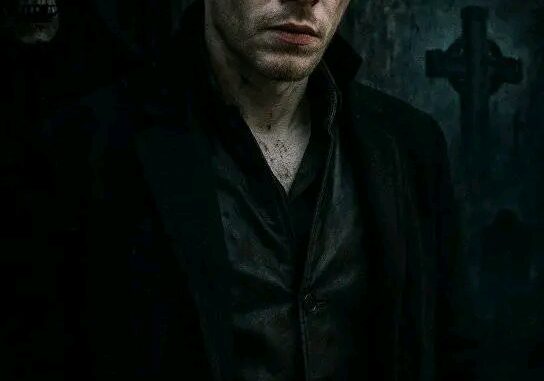
Born of Betrayal, Bound by Blood: Netflix Unveils Niklaus’ Turbulent Journey for Identity, Love, and Acceptance Amid Mikael’s WrathIn the ever-expanding universe of supernatural drama, few characters have captured hearts and stirred emotions like Niklaus Mikaelson.
Now, Netflix brings his story to the forefront, peeling back the layers of betrayal, family, and inner torment in a gripping exploration of a hybrid’s search for identity. Born of an illicit affair between Esther and the werewolf Ansel, Klaus is not just a vampire — he is the world’s first hybrid, a creature of both vampire and werewolf lineage. This unique origin sets the stage for a lifelong struggle that is as much internal as it is external.
From the moment of his birth, Klaus’ existence was branded with secrecy and shame. Esther, the Original witch and Klaus’ mother, bore him in the shadows of infidelity, while her husband Mikael, unaware at first, would soon become Klaus’ most ruthless tormentor. As the series unfolds, we see how the weight of that betrayal morphs into unrelenting hatred in Mikael’s eyes, transforming a father into a hunter. Yet, amid the violence and coldness, it is Esther’s conflicted but fierce maternal love that shields Klaus from utter destruction — though even that love is far from simple.
Netflix’s retelling is not just a supernatural tale — it is a psychological portrait of a broken son, a furious father, and a mother trapped between them. Mikael’s wrath is merciless. Seeing Klaus not as a child but as a symbol of Esther’s betrayal, he lashes out with a violence that echoes through centuries. The trauma that Klaus carries is deeply rooted in these early wounds, and it influences every relationship he forges. Even when he claims power, commands armies, or shows flashes of cruelty, viewers are reminded that behind the monster is a scarred boy yearning to be accepted.
One of the most intriguing aspects of this tale is Ansel — Klaus’ biological father. Silent, observant, and ultimately sacrificial, Ansel’s presence lingers in the shadows. He represents a truth that Klaus yearned for all his life but only uncovered too late. In one of the show’s most emotional arcs, Klaus meets Ansel without initially knowing their connection. The bond they begin to form is tragically short-lived, ending in another painful loss for Klaus. Ansel’s silence becomes symbolic of the peace and acceptance Klaus was always denied.
Netflix’s exploration doesn’t just follow Klaus through blood-soaked battles and magical showdowns; it dives deep into his identity crisis. Being a hybrid means he belongs nowhere — not fully vampire, not fully werewolf. Rejected by both worlds, Klaus builds his own kingdom, not out of ambition, but out of desperation to create a place where he might finally belong. This theme of forced independence and self-made family resonates strongly with anyone who’s ever felt like an outsider.
What truly elevates Klaus’ story is the emotional nuance. Yes, he is violent. Yes, he is manipulative. But he is also deeply wounded, fiercely loyal, and capable of intense love. His bond with his siblings — especially Elijah and Rebekah — is one of the most complex dynamics in the series. While he often drives them away with his mistrust and rage, they remain his anchor. Their shared pain becomes the thread that weaves them together in an unbreakable, if turbulent, tapestry of love.
Esther’s role is another compelling layer. As a mother and a witch, her choices are morally grey. She created vampires out of fear, protected Klaus out of guilt, and ultimately tried to undo what she began.
Her relationship with Klaus is haunted by contradiction — nurturing, yet destructive. Netflix brings out the tension in these mother-son scenes with powerful performances and raw dialogue that force viewers to question what love truly means when it’s wrapped in centuries of regret.
For all his sins, Klaus remains deeply human at his core — and that is perhaps the most powerful message of this Netflix reimagining. He wants to be loved. He wants to be forgiven. He wants to be seen for more than his rage.
In moments of vulnerability, especially with his daughter Hope, the mask slips. We see a man who has suffered more than he has inflicted. A man who fears his past will poison his legacy. A man who fights not just for dominance, but for redemption.Netflix’s bold retelling doesn’t shy away from the darkness in Klaus’ story.
It embraces it, using it as a backdrop to highlight his moments of light. Whether it’s saving his family from certain death, sparing an enemy for the sake of his daughter, or simply choosing to trust someone despite his trauma, Klaus’ growth is steady and hard-won. His journey shows us that monsters are not born — they are made, often by the very people who were supposed to protect them.
The world of “The Originals” has always been rich in mythology, but Netflix’s focused spotlight on Klaus adds a new dimension. By centering the story around his inner turmoil, the platform gives fans a deeper, more personal view of a character once feared and misunderstood. It becomes clear that Klaus’ greatest battle was never with his enemies — it was with himself.
For fans of supernatural drama, complex characters, and emotionally driven storytelling, this new chapter is a must-watch. It invites old and new viewers alike to walk in Klaus’ shoes, to feel his pain, to understand his fury, and — just maybe — to forgive him.
After all, who among us hasn’t felt like an outsider? Who hasn’t longed for love, acceptance, and a place to call home?“Born of betrayal, bound by blood” isn’t just a headline — it’s the essence of Klaus Mikaelson’s legacy. And now, thanks to Netflix, his story is more human, more heartbreaking, and more unforgettable than ever.
Leave a Reply